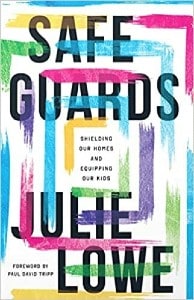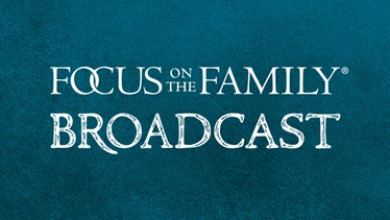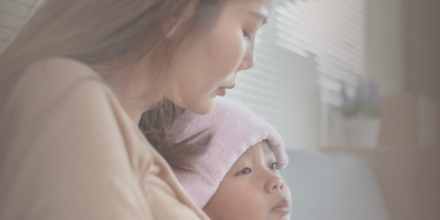Julie Lowe: Yes, safeguards, uh, is meaning I’m putting up protective measures to, uh, help my kids, to protect them. I can’t keep them from every danger in the world, nor should I. Um, that’s where we try to control our children. But I can put up safeguards to help them, to shield them from some of the darts that will be thrown their way while also equipping them to know how to protect themselves.
John Fuller: That’s Julie Lowe, and she’s our guest today on Focus on the Family. Your host is Focus president and author Jim Daly, and I’m John Fuller.
Jim Daly: You know, as a parent, you have a really important job. The Lord’s entrusted you with one or more little ones, and you’re gonna be raising them and probably in the midst of it right now. And as they grow and develop into young men and women, uh, you know, the stakes get a little higher. Teenage parenting is a little different from three, four year olds, isn’t it?
John: Mm-hmm. Absolutely. Yes.
Jim: (laughs) You know, in the New Testament Book of Matthew 10:6, Jesus tells us, “Behold, I’m sending you out as sheep in the midst of wolves, so be wise as serpents and innocent as doves.” And those words certainly are true for parents. We’re trying to nurture our children, love our children, teach our children how to live, uh, close to the Lord and also in a world that is ready to rip them apart in so many ways.
John: Mm-hmm. Yeah.
Jim: So what are we gonna do, you know, wrap them in bubble wrap or, you know, expose them and let them begin to understand what life’s about, that’s it’s not always gonna be perfect? Today we want to help you teach your children how to live not bubble wrap safeguard lives but how to trust the Lord and move forward in the Lord even in difficulty.
John: Mm-hmm. And Julie Lowe is a faculty member and licensed, uh, counselor at Christian Counseling and Educational Foundation. Uh, she’s captured a lot of great information in her book, Safeguards: Shielding our Homes and Equipping our Kids. We’ve got details, uh, about that book and more information about Julie and what she does at our website, focusonthefamily.com/broadcast.
Jim: Julie, welcome back to the ministry. It’s good to have you here at Focus.
Julie: Thank you. Thanks for having me.
Jim: Yeah. Let’s, uh, let’s kick it off. As a counselor, you’re working with lots of families. You’re hearing from lots of folks. You’re in Philadelphia, and I’m sure y-you get a smattering of topics coming at you. What are the top two or three that you’re dealing with, that the culture’s dealing with, really?
Julie: Mm-hmm. Well, in family life, you see a lot of the issues of technology, sexting, addiction to, uh, screens, things like that.
Jim: Mm-hmm.
Julie: You see a lot of struggles with, with gender and sexuality. Um, and just a lot of exposure to pornography these days.
Jim: Yeah. I mean, it, it’s, uh, it’s gripping. You know, I think in the old days, uh, it used to be, you had to go find things.
Julie: Right.
Jim: Now, it finds you-
Julie: Right.
Jim: … uh, through algorithms and artificial intelligence and other things and tries to hook you into what its doing-
John: Mm-hmm.
Jim: … whatever that might be. Um, as you started writing this book, Safeguards you built it on a threefold foundation. What are those three principles that you applied?
Julie: Well, I start off saying we, we live in a broken fallen world where there is evil, there is pain and suffering, there is horrible things that happen. Um, and ignoring that reality is not gonna help us. Um, accepting that reality, then equips us to start thinking about how do we enter in? How do we help our young people? Especially how, as a parent, do I enter in and put up safeguards for my kids? Uh, so that’s the first one. The second one would be, um, that we need to equip our kids with wisdom and discernment. So, the world talks about intuition and safety skills and those things are important, but I think, uh, as Christians we talk about the ability to distinguish good from evil.
Jim: Yeah. Let me ask you before you go to the third thing in that regard. H- yeah, I would think the early years of parenting, it’s you exerting protection over that child, which is completely normal because they really can’t do that for themselves, so you’re keeping them from harm.
Julie: Yeah.
Jim: It transitions, and I think the question is, about what age are you equipping them to begin making those decisions, ’cause you’re not gonna be around-
Julie: Yeah.
Jim: … et cetera? Maybe it’s school, or wherever it might be. So, h-h-how do you think of it in terms of phases with respect to, uh, you know, the protection-
Julie: Mm-hmm.
Jim: … in doing, making those decisions for them, and then empowering them to be in an environment where you may not be around?
Julie: Yeah. Well, I think, uh, as, until the kids are old enough to protect themselves, it is our job as adults and as parents to protect our kids. But at the same time, we are also teaching them the skills. We’re equipping them, uh, because we wanna raise competent equipped kids, not fearful kids.
Jim: Yeah.
Julie: Um, or not kids that are thrown into the world and they don’t know how to respond to life and its struggles.
Jim: It would seem to me that junior high is kind of a demarcation ’cause so much comes at those young people at that age. I mean, everybody’s developing at a different pace, you know? I remember being, you know, a seventh grader, I was young, I entered school as a five year old not a six year old.
Julie: Mm-hmm.
Jim: So, I, you know, at seventh grade, I was not filled out. I was still a skinny kid.
Julie: Mm-hmm.
Jim: You know, all those things. And tho- those are just tough things, and girls have their issues too-
Julie: Yeah.
Jim: … at that age in terms of development; their bodies, et cetera.
Julie: Yeah.
Jim: And in that regard, uh, I just think junior high is, y- they have to be ready to go by junior high.
Julie: Yeah. I’d argue it has to start a lot sooner because-
Jim: Yeah.
Julie: … kids are being given cellphones in first grade-
Jim: Yeah.
Julie: … and second grade, they’re being exposed to things without any ability to process what they’re seeing. So, if we wait too long, our kids are already hearing and being exposed to things without any loving guidance on how-
Jim: Yeah.
Julie: … to perceive it.
Jim: Okay, so we’ve covered, we live in a broken fallen world, the reality of that, the understanding of that.
Julie: Mm-hmm.
Jim: Secondly, we teach our children to navigate this world by giving them the ability to discern good from evil.
Julie: Mm-hmm.
Jim: Third, then, what is third?
Julie: The third is, ultimately, we trust God as our, our safeguard.
Jim: Mm-hmm.
Julie: Which doesn’t mean He keeps all evil out of our lives, but it means He walks us through-
Jim: Yeah.
Julie: … things that are hard and difficult.
Jim: Let me use an example for that. This is a funny one that Jean got me on. A zinger, as we say.
Julie: (laughs).
Jim: So, you know, I, it’s a few years ago, I’m not going far, so I don’t put my seatbelt on, and I said, “Well, Jean, hey, you know, if my number’s up, my number’s up. The Lord knows the number of my days.” And she said, “Yeah, that’s true, but he also gave you a brain.”
Julie: (laughs) Yeah. Use it up, right?
Jim: Which was a great line, like-
John: (laughs).
Jim: … you know how to put your seatbelt on, why don’t you put it on?
Julie: Yeah.
Jim: Speak to that duality because, you know, again, sometimes we can know what is right, but we don’t do what is right.
Julie: Yeah. Well, let me point to a verse. Hebrews 5:14, I love. It says, uh, “Solid food is for the mature. That comes from their powers of discernment, trained by constant practice to distinguish good from evil.” And I love that verse because it captures everything that, we wanna raise kids that know good from evil.
Jim: Mm-hmm.
Julie: And that comes by constant practice. That’s where role playing and helping them navigate situations is so critical. And what does that produce? It produces mature discerning kids.
Jim: Can I ask you, um, and again I think this is true for some. In the practice of teaching our kids that-
Julie: Mm-hmm.
Jim: … sometimes we might go overboard.
Julie: Yes.
Jim: I, I’m just saying that, you know, my experience in seeing some families, seems like it’s so heavy that the kids rebel against it actually. It’s a trigger for them, and they move in the other direction. How does a parent find the wise balance, not in terms of allowing evil, but I’m saying in terms of recognizing evil and teaching your children good from evil in a way that they get it and they’re going, “Yeah, okay, Dad.”
Julie: Yeah.
Jim: “Okay, Mom. I understand it. I see it.” An example, a-and not to bring this into a political discussion, but I remember when Troy, my youngest, was 14 probably. We were watching a political speech, and this person was pro-abortion and pro-police-
Julie: Mm-hmm.
Jim: … which was interesting in today’s vernacular.
Julie: Yeah.
Jim: But in that context, uh, the crowd booed when they talked about the police, and cheered when they talked about abortion.
Julie: Mm-hmm.
Jim: And I remember Troy went, “Wow. They’ve got that really messed up, don’t they Dad?”
Julie: Yeah.
Jim: “That they boo police and they cheer for the killing of children.” And I went, phew. It gave me sense that he gets it. He understands it. And that’s what you’re aiming for, I would think.
Julie: Yes.
Jim: Not to make those people out to be evil-
Julie: Yeah.
Jim: … but good and evil as a behavior.
Julie: Right. So there’s the constant practice. It’s conversation, it’s helping them s- to recognize things. It’s being out in public and watching a conflict happen, or, you know, during COVID, people fighting over masks, and your stepping back and you’re having your children talk about what do you see and what do you think about that? And you’re teaching them the skill of discernment and thinking critical thinking.
Jim: When we look at those main, uh, pressures of the culture, uh, technology, peer pressure, obviously, and just general pressure from the culture. You look at the education environment and university environment, they don’t lean toward Godly values, typically.
Julie: Right.
Jim: Um, so how do those outside influences potentially hurt our children?
Julie: Well, critical thinking is the key. When we’re teaching them to discern, we’re also helping them to realize, here’s what culture says; here’s what your professor says; here’s what your high school teacher says; what do you think about that? And kids learn by observation. And so, we have to be 10 times more, uh, involved in having conversations and processing with them the need to make sense out of their experience.
Jim: Yeah. What about the power, you said something there, that I think is interesting. That is something I didn’t use enough when I was raising our kids, uh, when Jean and I were raising our kids, and that is the power of the question. What do you think of that?
Julie: Yes, yeah.
Jim: Um, I think I often, uh, Julie, was guilty of telling them what to think-
Julie: Right.
Jim: … so describe the difference there.
Julie: Yeah. Well, I’m putting in there, lap a couple things. One is I’m saying, I care about your thoughts. And there’s a relationship building there. So it’s a back and forth. I wanna hear what you think. I’m dialoguing with you. I’m also then getting a window into how they think. And as a parent, there’ve been multiple times around the dining room table where we’re fostering conversation and I go, “Oh my goodness. I better follow up with that,” because I’m surprised-
Jim: Yeah.
Julie: … by what they’re saying and thinking.
Jim: Little flag.
Julie: Right, a big red flag. But if you’re not asking, what do you think, you never get a window into their heart to see where they’re at.
Jim: You know, Julie, too, th- there’s an art to this. And I want parents to hear this, especially those that may not be as artful. And I can go, you know, depending upon the circumstance, I could be good one day and bad the next.
Julie: Right.
Jim: So this is why I’m asking the question. You’ve gotta be really careful not to step on that child when they are sharing their heart with you.
Julie: Yeah, yeah.
Jim: Or you set up, secrecy basically. They will retreat-
Julie: Right, right.
Jim: … and not be open with you if you jump on it and start saying, “Well, how, how could you think that?”
Julie: Right.
Jim: And be, kind of angry or disciplinarian-
Julie: Authoritarian in the moment.
Jim: … in that moment. Authoritarian.
Julie: Yeah.
Jim: You wanna encourage, oh, tell me why you think that.
Julie: Yeah.
Jim: Why is it… You know, it’s so critical, but sometimes we lose patience. These are our children.
Julie: Yeah.
Jim: They shouldn’t be thinking like that.
Julie: Yeah.
Jim: And we don’t take the time to help guide them in their thinking.
Julie: Yeah. And here’s where if you start young, I mean, one of the things I think we hopefully did well, we’ll see if our kids say this someday, but, we would really foster conversation that get their opinions. And we came up with a, a game called agree disagree, where we go around the table and say-
Jim: (laughs).
Julie: … agree, disagree? Secrets are bad. And then we would always make them start and go around the table.
Jim: Yeah.
Julie: So they share their opinion, and then they had to share why, and then usually their siblings were debating them out before they even got to us.
Jim: Yeah.
Julie: And by the time they got to us, we had the ability to see how everybody thought. They were sharpening each other, debating-
Jim: Yeah.
Julie: … each other. And then we could weigh in at the end. And that just gave us a window into, uh, fostering conversation, but also knowing how they were thinking and developing that.
Jim: Um, you mentioned in the gospel Matthew, that Jesus encourages us to be salt and light. H- how does that have significance in this discussion about parenting?
Julie: Well, imagine if I’m teaching my kids to be discerning, that they can go out and evaluate, they’re going into their peer groups then, hopefully. They’re going into colleges, and they are being salt and light. They’re going to stand out as different in the world around them. They’re gonna be thinkers. They’re gonna push back on what they hear and what they see. They’re also gonna have protective boundaries up in their own lives as well.
Jim: Yeah, it-
Julie: The hope is.
Jim: Yeah. It’s so true. Another aspect that I’ve noticed, um, and this is, uh, I, it’s just inherent in parenting, especially Christian parenting, ’cause we’re so, at times, rightfully, understandably, fearful about the inputs that our kids are getting at school, outside the home, et cetera.
Julie: Yeah.
Jim: Friendships, technology, you name it. And, I- when that fear increases, I think for parents, our control then increases.
Julie: Right.
Jim: And, and that can be damaging in the relationship if we’re not careful.
Julie: Right.
Jim: So how do we, how do we balance all that? We have this fear-
Julie: Mm-hmm.
Jim: … you know? Little Johnny’s got the phone now. And we’ve got the software s-spying on him to make sure that (laughs) he’s-
Julie: Yeah.
Jim: … behaving properly.
Julie: Yeah.
Jim: But we might have some fear and then this massive control comes in to, you know, in some ways it’s, it’s fair to try to keep them safe. But where is that line, in your opinion, if there’s one-
Julie: Mm-hmm.
Jim: … where that control becomes destructive?
Julie: Yeah, I, I talk a lot, a lot about wisdom, but I think the relationship is what I want with my kids. I want them to want my influence. And they will resist it, they’ll rebuff it.
Jim: Yeah.
Julie: But if I say, “I love you and I care about you,” they’ll still disagree with me, but they’ll see that I genuinely love them. And I’ll often say, “Guys, you can disagree with us. We wanna hear, but then it’s our job to do what’s right and good for you.”
Jim: Yeah.
Julie: Um, so we try to instill over and over again, you are important to us and we love you, and we think this is bad for you, and we’re concerned for you. And I will do everything to try to get them to make the wise choice. But then, at some point, if I fear they’re in harms way, then it’s my job to step up.
Jim: Yeah.
Julie: But that’s not a control then, that’s a rescuing.
Jim: Yeah, yeah. And, again, that, this is an art. That’s why I said it that way. It’s not a science. You can’t get A plus B equals C every time.
Julie: Right.
Jim: So it’s the art of that parenting. Hearing yourself speak to your child when your control is too high.
Julie: Mm-hmm.
Jim: And you gotta back off a little bit, especially with teenagers because they’re trying to get independence and then you can inadvertently end up in some really bad places trying to do well. Uh, what’s the difference between intuition and discernment. Your, I, I know you’re leaning on discernment, but-
Julie: Yeah.
Jim: … describe the two because you mentioned it in the book.
Julie: Yeah, well, a, a lot of safety resources talk about intuition. And that word feels mystical, it feels intangible. Um, where I think perception and discernment are very tangible. Perception is paying attention to what’s actually happening even when you can’t put it to words right away. You sense something’s off. You’re feeling something, you’re seeing something. And, to me, that’s discernment, that Biblical category of discernment that says, “The wise person discerns between good and evil, right and wrong, uh, right and morally vague; you know, discernment is able to parse out all those things.” So, I think it’s a much better category for capturing that. Sometimes we know something’s off, but we can’t always put our finger on it.
Jim: For the mom that, eh, she’s just thinking maybe, maybe not. What encouragement as a counselor do you have for, for that mom? I’m just thinking of that situation that Jean found herself in sometimes, with volunteering at the school and seeing some things that concerned her. Um, acting on it, which she always did. She was really good at putting her discernment-
Julie: Yeah.
Jim: … into action.
Julie: Yeah.
Jim: So speak to the mom that might be feeling a little more awkward about it, doesn’t know, am I really seeing what I’m seeing or hearing what I’m hearing?
Julie: Yeah. I would say the, the keywords are noticing and paying attention. So sometimes we notice something s- feels off but we don’t have any right to step in, or we, we can’t say the person’s doing something morally inappropriate and that’s fine. I can say that. But I can say, but I’m still gonna notice. I’m still gonna pay attention. I’m still gonna have eyes on it. I tell my kids, if you’re uncertain, bring somebody else into it.
Jim: Mm. That’s good.
Julie: And, have somebody else paying attention too. So that language doesn’t feel… We, we use language of judging. I don’t wanna judge somebody. And I say, but we are called to judge, uh, behaviors and actions. We’re called to evaluate behaviors and words. So when something’s off, we can evaluate that.
Jim: Mm-hmm.
Julie: Um, and so that feels less judgmental and more wise to say, I’m evaluating. I’m noticing. I’m paying attention.
John: Mm-hmm. Well this is Focus on the Family with Jim Daly. Our guest today, Julie Lowe. And, uh, we’re talking about parenting, and really, uh, discerningly and wisely with our kids. Uh, Julie has a great book. It’s called Safeguards: Shielding our Homes and Equipping our Kids. Uh, stop by focusonthefamily.com/broadcast uh, to learn more, or call us 800, the letter A and the word FAMILY.
Jim: Julie, uh, I love this story because it’s so much of a teaching story. You took your boys to the pediatrician and he was, you know, asking the normal questions pediatricians do. Uh, you know, do you know about stranger danger? And I think I remember a conversation somewhat like that. You kinda hit back, though, on the pediatrician. What, what happened?
Julie: Yeah. I mean, the typical, do you wear your seatbelt? Do you wear a helmet? And they said, and stranger danger. And the boys both turned and look at me. And I said, “Well, actually, we don’t teach our kids stranger danger. Strangers aren’t dangerous. Dangerous people are dangerous.” And, you know, in my f-
Jim: Now, some people, uh, right now they’re hearing that, going, whoa, whoa, whoa, ’cause we’re so indoctrinated of that.
Julie: Yeah.
Jim: But it is true. Dangerous people are dangerous. Not all strangers are dangerous.
Julie: Right.
Jim: But y-you know, you want some c- you wanna guard up a little bit, right?
Julie: Right, right. Well, so what we tell our kids is, strangers aren’t dangerous, dangerous people are. How do you know somebody’s dangerous? You watch their words and actions. We are notoriously terrible at evaluating character. And deceitful people hide their true motives. But we can always evaluate somebody’s words and behaviors. Are they leading you astray? Are they asking you to go somewhere alone? Things like that. And if my child was ever lost, their very ability to approach a stranger is gonna be critical to help them. So, we always taught our children, you need to know how to talk to strangers, and what’s appropriate to share with them, because you’re more likely to be harmed by somebody you know. And so, my fear, especially with parents is, you know, kids grow up with this mentality that a stranger or a dangerous person who’s out to harm them is gonna be missing teeth, have long greasy hair, and lurk in dark places; instead of saying, you know, people you know, and even people you love and trust are capable of harming you. So I want you to learn to pay attention to people’s words and actions.
Jim: Yeah. Y- you know, in, in that regard, uh, even with the culture right now, we, we tend to look down on people who are judgmental.
Julie: Mm-hmm.
Jim: And it’s a good thing to teach our kids. What you’re saying, a-a-and really just reemphasizing what you’re saying, which is, talk about behavior, not the person. I think younger generations get that.
Julie: Yeah.
Jim: And I think they actually would agree with that. That as long as we’re not demeaning of the person, because they get a lot of that, right?
Julie: Right.
Jim: I mean, girl on girl bullying with technology and other things.
Julie: Mm-hmm. Yeah.
Jim: So, to set that up with your kids, to say what we’re talking about is not condoning behavior that doesn’t represent us well, or-
Julie: Yeah.
Jim: … represent the scripture well, et cetera. Doesn’t mean you’re a bad person, it just means you’re doing things that are inconsistent with what we believe.
Julie: Right. So think of the example of being in church and somebody’s a little more touchy-feely with your kids than you like, or they’re holding them or hugging them or just things that you feel uncomfortable with it, but you’re not noticing anything inappropriate, and so what do you do? A lot of people freeze. And if you and I as adults freeze in those situations, how much more our children if we don’t-
Jim: Mm-hmm.
Julie: … equip them. So, to be able to say something like, you’re making me uncomfortable, or, uh, so-and-so is uncomfortable. I’m not putting any assessment on your motives, but I am seeing the behavior. And so a parent is noticing things, but they’re afraid of misjudging somebody or judging too harshly, needs to have the freedom to say, I can notice, or I can point out that this feels uncomfortable. And just call it that.
Jim: Yeah.
Julie: And be okay with it.
Jim: How do we, how do we teach that to our kids in terms of helping them understand behavior.
Julie: Role play, role play, role play. Practice, that constant practice we talk about. So, I need to be able to say to my kids, if we’re driving somewhere, or sitting around having dinner, what would you do if somebody held you too long? Like, somebody came up and gave you a hug and you really didn’t want it. Um, in our current culture, the, the tide is to say, uh, you should never have kids hug their grandparents or aunts or uncles if they’re uncomfortable because you’re setting them up to be groomed. You’re setting them up for abuse. And I say, well, it’s not necessarily true. I make my kids do uncomfortable things all day long like brush their teeth and-
Jim: Mm-hmm.
Julie: … put on deodorant.
Jim: Wash tier hair (laughs).
Julie: Wash their hair, you know?
Jim: As an example.
Julie: Teenage boys, but-
Jim: (laughs).
Julie: … I do say, pay attention. And if you’re uncomfortable, I wanna know why. Now let’s process why. Are you uncomfortable ’cause grandma smells like mothballs and you don’t wanna hug her? Well, love moves towards her. Are you uncomfortable because they’re holding you too long or they rubbed your back in a way that made you feel awkward? That’s okay to say I’m uncomfortable then.
Jim: Mm-hmm.
Julie: And so you role play and you give them the scenarios and then you let them push back and challenge you.
Jim: Yeah. Let me, uh, hit this as well, the reality check, here. W-what dangers are kids really facing today when you look at it? You’re the counselor. You’re the one talking to these families.
Julie: Mm-hmm.
Jim: What, what do they come to you with?
Julie: A lot of stuff on technology. The amount of pornography and sexting and, uh, in appropriate content they’re seeing, uh, is just staggering. And nobody’s holding them accountable. We’re not talking about stewardship principles. We’re not talking about safeguards for technology. We’re not assuming our kids are into it, instead of saying it’s not if, but when.
Jim: Yeah.
Julie: When they get exposed to these things.
Jim: In that context, though, it’s also, you know, what I feel we have to do is to teach them to say no.
Julie: Mm-hmm.
Jim: I mean, it’s bombarding them-
Julie: Yeah.
Jim: … we’re not gonna be there every time.
Julie: Yeah.
Jim: Make that assumption. Back to your original three philosophies that-
Julie: Yeah.
Jim: … we live in a fallen world, so in that fallen world, things are coming toward our children all the time. So how do we teach them to make proper choices and to, uh, go in the right direction when we’re not there?
Julie: Yeah. Well, most parents spend most of their, uh, parenting teaching their kids to comply and obey, but I argue, I also want to teach my kids when to defy authority. And so I’ll say to our kids, since they were little, if somebody tells you something right and good to do, you should always obey no matter who it is. Could be your teacher, your aunt, your cousin, your younger brother, the family dog.
Jim: (laughs).
Julie: Um, it doesn’t matter who it is, if it’s the right thing to do, you should obey. Likewise, if it’s the wrong thing to do, you should never listen and we will support you. And then you have to give examples because they don’t assume, if I’ve raised my kids well, they don’t assume any of their authority figures are gonna tell them something wrong to do. So I’ve gotta practice. I’ve gotta say, what, what do you do if the babysitter tells you to do something bad? What might be a bad things a babysitter tells you to do?
Jim: Yeah.
Julie: You always have a right to say no to that and we will support you.
Jim: Mm-hmm. In fact, I think, uh, your son, I think, had a story of bullying, and-
Julie: Yeah.
Jim: … the, it fits right here. So let’s talk about that.
Julie: Yeah. I mean, h- it was an afterschool program, and, you know, one of the things I read from wiser people is, you know, always tell your child, keep telling somebody until somebody listens. If you’re in trouble, keep telling people till they listen. And so we had practiced this with our kids. And my youngest son was, uh, was with a child who kept being mean spirited, knocking things over, destroying things he was doing, so he got up and told somebody. They talked to him, but then it continued. And so my son got up and told somebody else. Talked to- this happened several times, till eventually I think they got in a shoving match, or he pushed back and fought back. And they both ended up in front of the principal. And one of the things we said to him is, “Honey, we support you. You did the right thing. You told three different adults and it continued.” And so, you know, parents are gonna fall in different places, but I couldn’t fault him for defending himself. Um, and teaching our kids the skill of when is it okay to standup for somebody else? When’s it okay to stand up for yourself as well?
Jim: Right. No, I think that’s a tremendous skill and, you know, I’ve seen that with my boys too when they’ve stood up to certain situations.
Julie: Yeah.
Jim: I was like, wow, that is awesome.
Julie: Mm-hmm.
Jim: Um, especially troublemakers. If I could say it that way.
Julie: And that comes with right and wrong.
Jim: Yeah.
Julie: They’re discerning right from wrong.
Jim: Yeah. I mean, it’s really, it’s good to see that when your kids are maturing.
Julie: Yeah.
Jim: And you’ll see those milestones.
Julie: Yeah.
Jim: Or you won’t.
Julie: Yeah.
Jim: And then that should help guide, again, what you do.
Julie: Yeah.
Jim: Uh, Julie, as we wrap up, uh, speak a word of encouragement to the mom or dad who are panicking as they’re listening. Maybe they, uh, are aware of some things their kids are dealing with, but that fear is gripping them. How to address it, what to say, et cetera. How would you coach them to get involved? Roll up your sleeves. I guess, I’m also speaking to the more distant dad. I mean, we get, you know, not to throw a stereotype out here, but-
Julie: Yeah.
Jim: … moms are engaged and the pillow talk goes something like, “Honey, you need to engage-
Julie: (laughs).
Jim: … with our son ’cause he’s doing things at school that are disruptive. And he’s not listening to me. So he needs some help from you.” Okay. And-
Julie: Yeah.
Jim: … we don’t know what to do.
John: Mm-hmm.
Julie: Yeah. Uh, well, it’s never too late for example, no matter what age your children are at, it’s never too late to start talking to them and encouraging them and having these kinda conversations. And we don’t wanna live in fear. I will not help my children. I’ll raise fearful kids if I respond in fear. Or I can raise competent equipped kids if I am just factual, casual, I have a conversation just like you and I are having. I’m not eliciting fear, I’m, I’m making it sound like no topic’s off limits. We can talk about anything and Mom and Dad expect these things to happen and we want you to know what to do.
Jim: Mm-hmm. It’s been really good.
John: Mm-hmm.
Jim: And, uh, again, for me, when I have someone like you on the broadcast or the YouTube here, it, I wish I could roll the clock back. That’s my only regret ’cause you’re, you know, you’re giving us such good food for thought as parents. And maybe some things that, well, I’ll speak for myself, that I could’ve done better. And this is why we’re doing this, and it’s great to have you, Julie. Let’s stick around and go for-
Julie: Thank you.
Jim: … day two and cover some more content. Can we do that?
Julie: Great.
Jim: I mean, this is why Focus is here. We want to equip you as a parent to do the best job you can do and we’re here to help you. Boy, we’ve got so many resources. Focus is just a resource center for you. We have caring Christian counselors you can talk to. They’ll provide, um, uh, certainly, uh, an ear and some perspective in addition to resources, uh, that will help you.
John: Mm-hmm.
Jim: One of the great resources today, obviously is Safeguards by Julie and we’ll send that to you as a way of saying thank you if you can help us with the ministry. Make a donation of any amount. If you could do it monthly, that really helps. But one-time gift, uh, is good as well. So send that to us and we’ll send you a copy of the book to say thank you for being involved in the ministry.
John: Yeah, join us as we reach around the world and, uh, as Jim said, equip parents. Uh, donate as you can when you call 800, the letter A, and the world FAMILY, or stop by focusonthefamily.com/broadcast. On behalf of Jim Daly and the entire team, thanks for joining us today for Focus on the Family. Plan to be with us next time as we continue the conversation with Julie Lowe, and once again help you and your family thrive in Christ.






















